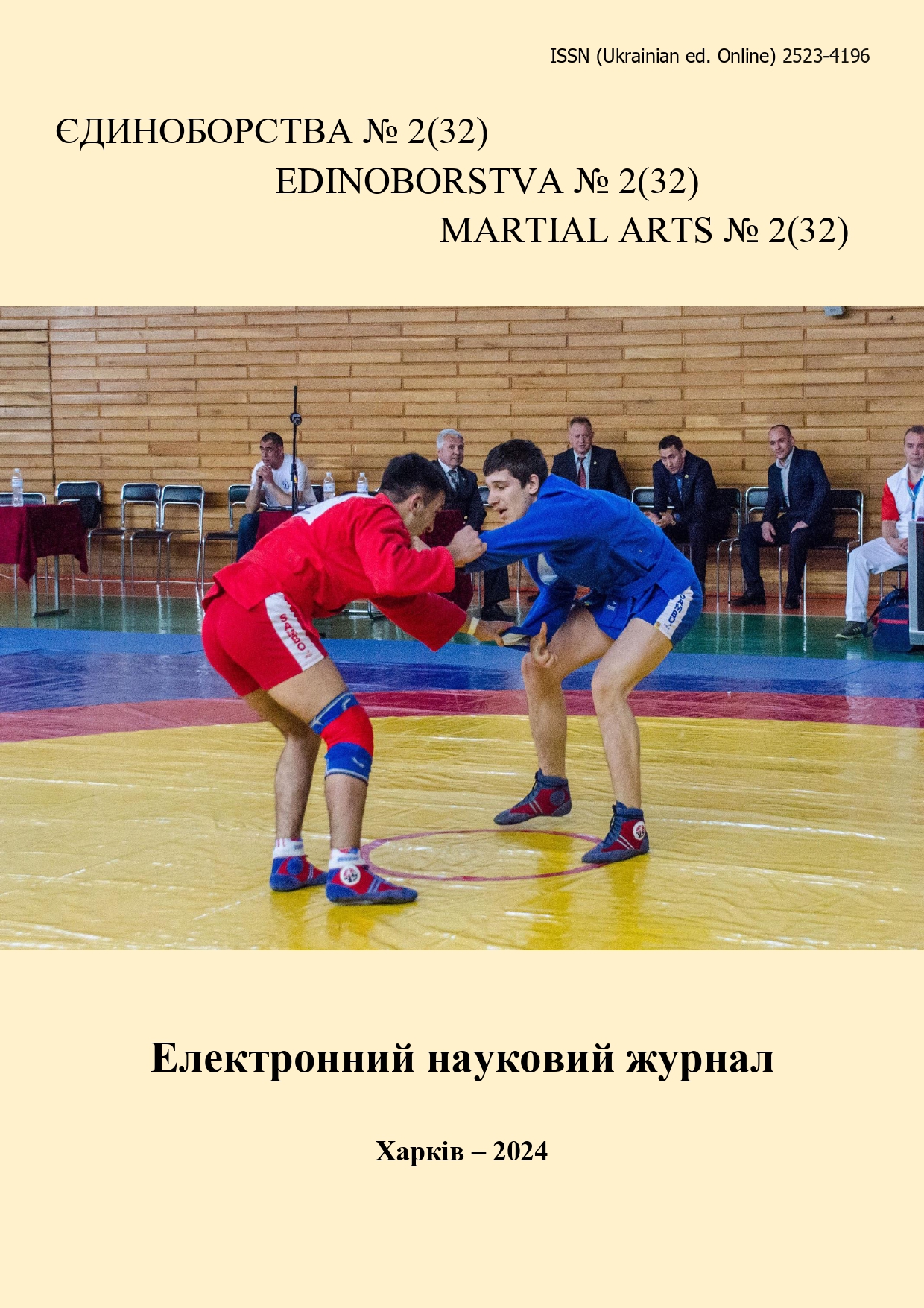Peculiarities of the mental state of qualified wrestlers
DOI:
https://doi.org/10.15391/ed.2024-2.05Keywords:
mental state, qualified wrestlers, heart rate regulation, indicators, analysisAbstract
Purpose: research of psychical state in qualified wrestlers in stage of special basic fitness. Material and methods. The study involved 31 skilled Greco-Roman wrestlers aged 14-16 years, pupils of the wrestling club in Kremenchuk. To assess the mental state of skilled wrestlers, the Luscher color test was used. According to the results of the study, the following indicators were obtained: performance, fatigue, anxiety, deviation from the autogenous norm, eccentricity, concentricity, vegetative coefficient, heteronomy and autonomy. Heart rate variability was studied as an indicator of mental stress. The cardiac monitor «Fazagraf» was used. Based on the results of the study, we obtained statistical processing indicators and spectral characteristics of cardiac intervals. Non-parametric statistics with the determination of the median, lower and upper quartiles were used to assess the differences between the studied parameters. Results: in wrestlers with high tension of the autonomic regulation system, a deterministic functional system aimed at ensuring the mental state is revealed. At the same time, an increase in the tension of autonomic regulation is accompanied by mental fatigue, anxiety, passivity and the presence of mental stress. Prevention of mental stress in skilled wrestlers may be associated with the activation of the athlete to external environmental stimuli, optimism and a mood for positive behavior. The relationship between the indicators of mental state and the parameters of mental functions in skilled wrestlers was revealed. The moderate tension of the heart rate regulation system in skilled wrestlers is accompanied by an increase in mental performance and a decrease in anxiety. In turn, the increase in the tension of autonomous regulation is reflected in the presence of internal psychological discomfort and independence in the formation of decision-making. However, there is an increase in anxiety and a decrease in mental performance. Conclusions. The relationship between indicators of mental state and parameters of psychical functions in qualified wrestlers was revealed. Moderate tension of the heart rhythm regulation system in qualified wrestlers is accompanied by an increase in mental capacity and a decrease in anxiety. The increase in the tension of autonomous regulation in qualified wrestlers is reflected in the presence of internal psychological discomfort and independence in decision-making.
References
Антомонов, М.Ю., Коробейніков, Г.В., Хмельницька, І.В., & Харковлюк-Балакіна, Н.В. (2021). Математичні методи оброблення та моделювання результатів експериментальних досліджень: навчальний посібник. Олімпійска література, Київ.
Лисенко, О., Федорчук, С., Колосова, О., & Тимошенко, О. (2023). Адаптацiя до напруженої м’язової дiяльностi та особливостi вегетативної регуляцiї варiабельностi серцевого ритму спортсменiв (ii повiдомлення). Спортивна наука та здоров'я людини, 2(10), 119-141. DOI:10.28925/2664-2069.2023.210
Романчук, О.П., & Гузій, О.В. (2020). Сучасні підходи до об’єктивізації функціонального стану організму спортсменів при поточних обстеженнях. Фізична реабілітація та рекреаційно-оздоровчі технології, 5(1), 8-18. DOI:10.15391/prrht.2020-5(1).02
Alibekova, S.S., Aliev, I.S., & Aliyev, S.A. (2023). Sportive stress and its impact on the immune state of athletes dealing with freestyle wrestling. Experimental Biology, 94(1), 144-153. DOI:10.26577/eb.2023.v94.i1.013
Curby, D., Dokmanac, M., Kerimov, F., Tropin, Y., Latyshev, M., Bezkorovainyi, D., & Korobeynikov, G. (2023). Performance of wrestlers at the Olympic Games: gender aspect. Pedagogy of Physical Culture and Sports, 27(6), 487-493. DOI:10.15561/26649837.2023.0607
Deliceoğlu, G., Tortu, E., Keleş, A., Çakar, A.N., Özsoy, H.Ö., & Atalay, T.A. (2023). Comparison of Physical and Physiological Profiles Between Elite Freestyle Men and Women Wrestlers. European Journal of Human Movement, 50, 103-124. DOI:10.21134/eurjhm.2023.50.11
Franchini, E. (2021). Future Issues In Wrestling Research: A Sport Sciences Perspective. International Journal of Wrestling Science, 11(2), 2-7.
He, G., Liu, G., & Zhao, J. (2022). Physiological monitoring of intensity training in female wrestlers. Revista Brasileira de Medicina do Esporte, 28, 804-806. DOI:10.1590/1517-8692202228062022_0037
İslam, A. (2022). The effect of athletic mental energy on wrestlers’ sports courage and attitudes toward wrestling. Physical Education of Students, 26(5), 247-255. DOI:10.15561/20755279.2022.0504
Jafari, R.A. (2021). Responses of blood lactate concentration, heart rate, and blood pressure using three active recovery methods versus passive recovery after an exhaustive exercise in young elite wrestlers. Journal of Exercise and Health Science, 1(2), 35-54. DOI:10.22089/jehs.2021.9629.1014
Karninčić, H., Baić, M., Slačanac, K., Penjak, A., & Jelaska, I. (2018). Relationship Between Training Experience and Pre-Competition Mood States in Cadet Wrestlers. International Journal of Wrestling Science, 1(1), 9-13.
Korobeynikov, G.V., Korobeinikova, L.H., & Korobeinikova, I.H. (2023). Stress management in restling. Publishing House «Baltija Publishing».
Korobeynikov, G.V., Korobeynikova, L.G., Kokhanevich, A.I., Danko, T.H., Korobeynikova, I.G., & Kostyuchenko, V.I. (2022). Functional state in young wrestlers with different latency of visual response. Health-saving technologies, rehabilitation and physical therapy, 3(1), 123-126. DOI:10.58962/HSTRPT.2022.3.1.123-126
Pryimakov, O., Iermakov, S., Eider, J., Prysiazhniuk, S., & Mazurok, N. (2020). Physiological criteria of functional fitness and determinants of physical work capacity of highly skilled wrestlers. Physical education of students, 24(4), 205-212. DOI:10.15561/20755279.2020.0403
Sciranka, J., Augustovicova, D., & Stefanovsky, M. (2022). Time-motion analysis in freestyle wrestling: Weight category as a factor in different time-motion structures. Ido Movement for Culture. Journal of Martial Arts Anthropology, 22(1), 1-8. DOI:10.14589/ido.22.1.1
Shandrygos, V.I., Blazheyko, A.I., Latyshev, N.V., Tropyn, Y.N., Boychenko, N.V., & Myroshnychenho, Y.S. (2022). Analysis of the performances of the national team of Ukraine in women’s wrestling at official competitions (1992–2021): second message. Rehabilitation & Recreation, 10, 170-183. DOI:10.32782/2522-1795.2022.10.22
Wareth, H.A., & Abdo, A. (2022). Differences in Mood Patterns and Psychological Characteristics of Young Wrestlers. Assiut Journal of Sport Science and Arts, 2, 1-13. DOI:10.21608/ajssa.2022.295712
Yadav, M.H. (2020). Sport psychology: an analysis of athletes and wrestling behavior. International journal, 5(12), 230-233.
Yıldırım, Y., Arabacı, R., Güngör, A. K., & Görgülü, R. (2023). The effects of dynamic and static stretching exercises performed to elite wrestlers after high intensity exercise on heart rate variability. Science & Sports, 38(1), 2-11. DOI:10.1016/j.scispo.2022.03.008
Yoon, J. (2002). Physiological profiles of elite senior wrestlers. Sports Medicine, 32, 225-233.











